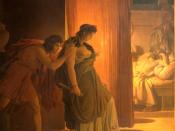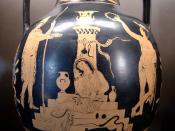Power and its Effect What is power? Its meaning has been explored and subject to interpretation by many cultures, starting with early civilization. Power always plays a crucial role in any society, and dictates the future of that society and the members of that society. The usual reason for the collapse of a society is a group or persons want for power, and the lengths to which they will go to achieve this power. Hence, "the desire for power is the catalyst for tragedy." This was the case in Aeschylus's The Oresteia.
In the first two plays of The Orestia, Aeschylus explored the theme of power and the emotions behind the desire to control. Although Aeschylus lived during 458 B.C., and the play is set in the recesses of ancient Greek mythology, it's tale still has relevance today. Clytaemestra, driven by jealousy and envy, murdered her husband Agamemnon to claim the throne for herself in The Agamemnon. Much like Agamemnon's distraught son, Orestes, who revenges his father's death in The Libation Bearers by killing Clytaemestra and Aegisthus. The desire for power, which Agamemnon and Orestes experienced, is a catalyst for tragedy. Power the most important component in any societies, or family's political structure. And people's desire for power in either structure can create extreme consequences. Clytaemestra murdered Agamemnon with little emotion, driven by her desire for the attention she never received, and jealous of the power he possessed as a ruler. After the murder Clytaemestra banished Orestes from Argos, afraid that he would some day challenge her possession of the throne, and take back that which was rightfully his. Her fears were brought to life in The Libation Bearers when Orestes returns to morn for his father, and in a state of great anger and torment,


